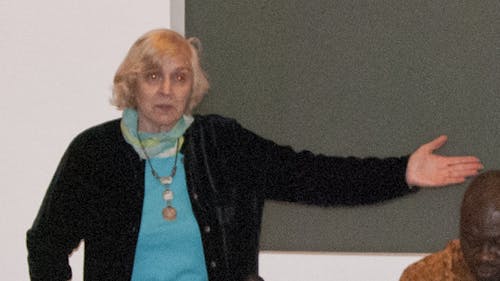Public health experts discuss solutions to Ebola crisis

“Fear, hysteria — all those things travel through the air, but not Ebola,” said Tefera Gezmu, epidemiologist and assistant research professor in the Edward J. Bloustein School of Planning and Public Policy.
An infectious disease is not the same thing as a contagious disease, he said. The chance of passing a contagious disease, like the common flu or the measles, is much higher than transmitting an infectious disease like Ebola.
A teach-in on the “Political Economy of Ebola” was held yesterday in the Civic Square Building on the College Avenue campus, sponsored by the Center for African Studies, the Bloustein School and the Department of History at Rutgers.
The teach-in happens to have taken place the same day a doctor in New York City, who recently returned from treating Ebola patients in Guinea, tested positive for the Ebola virus, becoming the city’s first diagnosed case, according to an article in The New York Times.
Four panelists met to discuss Ebola — what it is, who the disease is affecting and potential solutions.
Renee Larrier, associate director of the Center for African Studies, moderated the event and said there is too much hysteria in the United States surrounding Ebola.
She referenced a more concerning virus called Enterovirus D68, which is affecting hundreds of people in the country right now.
It seems as though almost all the recent news coverage has been about Ebola, Gezmu said. Luckily, he said the hysteria is dying down, and the news seems to be shifting its gears to other topics.
“I’m not saying we don’t need to have it in news, but there shouldn’t be a scare approach to where people who are not at risk are panicking,” Gezmu said.
Allen Howard, professor emeritus in the Department of History at Rutgers, said most health care specialists would say Ebola is not a true medical issue in the U.S. compared to the state of crisis in Sierra Leone, Guinea and Liberia. These three countries lack the funding to support good health care systems.
“The real focus should be on the people who are suffering in West Africa and finding a long-term way of addressing these health care [issues],” Howard said.
The U.S. military could aid the short-term problem of delivering health care and constructing hospitals, Howard said. But these needs would be better met by non-governmental agencies like Doctors Without Borders.
The Ebola Hemorrhagic Fever is caused by the immune system attacking filoviruses.
There are different strains of the disease, and these strains have been infecting humans around the world since 1976, Gezmu said. The scientific terms for the strain we hear about today is “Zaire ebolavirus.”
Ebola multiplies in billions and most of the time kills the host. It is capable of being infectious as well as pathogenic and virulent.
Patients tend to show uniquely high levels of body secretions, Gezmu said. Transmission occurs only through direct physical contact with infected droplets of body fluids, such as sweat or blood.
The virus incubates for a period of two to 21 days before symptoms occur, which usually include abrupt headaches, fever, chills, muscle aches and sore throat.
Three other symptoms — diarrhea, nosebleeds and vomiting — increase the chances of transmission, especially in hospital settings.
Some people with Ebola, referred to as “super-shedders,” never get sick at all. These people have been exposed to small amounts of the virus repeatedly, causing them to develop antibodies.
When it comes to diagnosing Ebola, the best and simplest method is “PCR,” a technique that looks for genetic material from the virus and creates enough copies of it so it can be detected, Gezmu said.
Because of the cost associated with this technique, it is rarely used, especially in the low-income countries where Ebola is most prevalent.
The next-best thing doctors can do is blood counts, he said, which reveal important information about the types and amount of cells in the blood.
No specific treatment is effective against a filovirus infection, but prevention and research for effective vaccines are the best ways to stop the disease from spreading.
The problem with prevention, Gezmu said, is that sanitation methods and other things seen as common sense in America are not used in low-income countries. The biggest issue is the lack of resources.
Ismail Rashid, who grew up in Sierra Leone and is a professor at Vassar College, said resources were especially lacking when Ebola first broke out in West Africa.
Meredeth Turshen, professor in the Bloustein School, said these countries are coming out of colonialism with underdeveloped health services.
Neoliberalism, a new form of capitalism that believes everything should be in private hands, led to no public health universities or public health services and, thus, “an absolute disaster,” she said.
When the disease broke out, hospitals had no more than two ambulances and five or six doctors. Most of the people helping were nurses.
According to the Liberian government, 75 percent of Liberian health care workers are women, Turshen said.
Rashid said health care has been considered a “female profession” for a long time in most parts of West Africa.
“They are the people who care mostly for the sick,” Rashid said.
The best solution to the lack of resources would be to build health care services in West African countries by placing a tax on the diamond and weapons industries, Turshen said.
The best hope, Rashid said, is that Ebola will continue to burn out across the next few years and stories of survival will prevail over those of tragic death.



